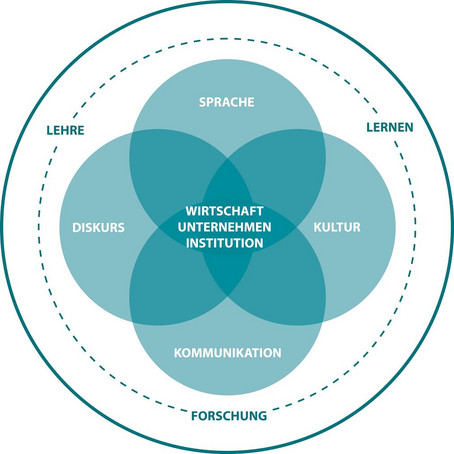Leitbild Forschung
Mission statement
We understand language(s) and communication as vital for value creation in all economic activities in the commercial, non-profit, and public sectors. Our thematic emphasis and research questions are geared to language use in business and the economy in all its forms. Our theories and methodology are well founded in applied linguistics and in the individual language studies – English, Romance, and Slavic language studies –, as well as in cultural, social, and economic sciences. Our language- and communication-based approach is an integral part of the research and teaching taking place at Vienna University of Economics and Business.
Research Profile
Our research provides innovative insights in the field of (International) Business Communication. The approaches taken in individual research projects comprise a wide range of theories and methodologies; cohesion is ensured by the research profile of the Department, which is based on the interplay of four main areas of study: language(s), discourse, communication, and culture(s).

Language(s): We have a long tradition of research into the language-specific aspects of business and economics for English as well as several Romance and Slavic languages. Research projects focusing on terminology explore lexico-grammatical and lexico-semantic features, genre and register in various business contexts and contribute thus to a better understanding of the characteristics of Language for Specific (Business) Purposes. Research findings in terminology, but also in multilingualism and language choice in business, feed into the teaching programme of our department.
Discourse: Several research projects engage in the study of discourse, that is, language use in context. They focus on discourse in legal, political, commercial or workplace contexts and explore language use in media for business-related purposes across several languages and cultures. This line of research examines discursive strategies that serve to persuade and legitimize, or give expression to and construct particular world views, in order to gain insights into the workings of different genres and the impact of the wider cultural framing of discourse. The findings in this area of study feed directly into enhancing students’ understanding of societal mechanisms of power and control, thus increasing their critical competence and honing their rhetorical skills.
Communication practices: One of the main tenets of research at the Department is the study of communication practices in organizations (internal) as well as beyond organizations (external). This involves the study of communication between different levels of employees, such as managerial communication and intergroup relations, but equally focuses on topics that have more recently gained in importance for a global economy, such as multilingual and intercultural concerns. In view of the importance of communication to the day-to-day activities of organizations, insights gained in this area of study are immediately relevant for students at our University as well as for businesses aiming to better understand and improve their communication practices.
Culture(s): We understand culture(s) as being reflected in but also constitutive of a community’s discourse. Our research helps gain a deeper understanding of how members of a community communicate with each other and with other communities by looking at the interface of language, communication and discourse. Our research projects focus on various cultures and markets where English, Romance or Slavic languages are spoken.
Teaching: The findings originating from these fields are directly relevant for students, instructors and practitioners alike and are linked to the curricula of Language and Business Communication as well as Intercultural Competence courses run by the Department. Students are trained in the effective comprehension and production of a variety of spoken and written business communication formats, and in the intricacies of language use appropriate to specific discursive contexts across several languages and cultures.
